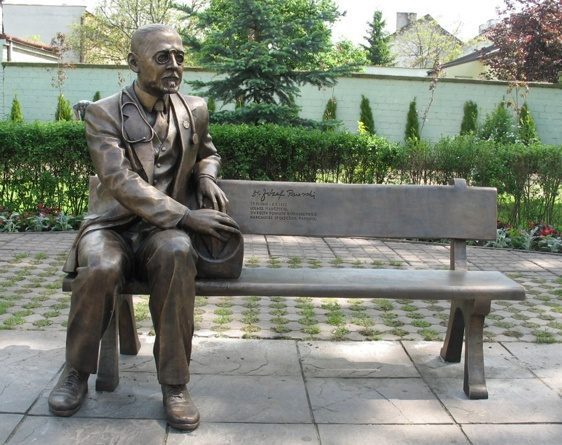
Józef Piotr Psarski (ur. 19 marca 1868 w Grabowej, k. Piotrkowa Trybunalskiego - zm. 6 października 1953 w Ostrołęce) - lekarz, działacz narodowy, społeczny i oświatowy, członek stowarzyszeń niepodległościowych. Jeden z najbardziej zasłużonych ludzi dla Ostrołęki i okolic. Pochodził z drobnoszlacheckiej rodziny o rycerskich tradycjach (herbu Jastrzębiec). W 1894 ukończył studia na uczelni medycznej w Kijowie, uzyskując dyplom doktora medycyny o specjalizacji internisty, pediatry oraz ginekologa-położnika. W Ostrołęce osiedlił się po zakończeniu studiów i pracował jako lekarz kolejowy. Ponadto zajmował się działalnością oświatową. Organizował m.in. tajne nauczanie, był założycielem biblioteki, która stanowiła pierwszą książnicę na terenie Ostrołęki. Za swoją działalność kilkakrotnie zsyłany był do Rosji. W czasie I wojny światowej udzielał pomocy (głównie lekarskiej) wygnańcom z terenów Kurpiowszczyzny. Po wojnie zaangażował się mocno w rozwój oświaty i szkolnictwa w Ostrołęce. To głównie dzięki jego staraniom powstało w 1919 Gimnazjum im. Króla Stanisława Leszczyńskiego. W 1921 z jego inicjatywy założona została szkoła ślusarsko-mechaniczna. Celem szkoły, zwanej powszechnie rzemieślniczą, było kształcenie młodzieży z rodzin robotniczych i chłopskich. J. Psarski sens istnienia szkoły widział w możliwości zdobycia zawodu przez przedstawicieli biedniejszych grup społecznych. Na bazie tej szkoły szerzono w terenie – na ile to było możliwe – przemysł, choćby produkcję pieców CO i kłódek. W swojej szkole Doktor prowadził zajęcia z higieny. Wobec dużej śmiertelności niemowląt przetłumaczył z francuskiego i przepisywał stalówką dla dziewcząt zasady pielęgnacji noworodków. W latach 1927-1933 prowadził wykłady na Uniwersytecie Ludowym w Ostrołęce.
Ponadto angażował się w działalność polityczną i społeczną. Był członkiem kilku organizacji niepodległościowych, m.in. Ligi Narodowej. Znane są jego powiązania z endecją i Romanem Dmowskim. W okresie poprzedzającym I wojnę światową utrzymywał kontakt z ośrodkami konspiracyjnymi w Warszawie. W 1919 został wybrany członkiem Rady Miejskiej w Ostrołęce, wcześniej pełnił stanowisko Starosty Ostrołęckiego. Dzięki jego staraniom powstał w okresie międzywojennym pierwszy w Ostrołęce sklep spółdzielczy, a także bezprocentowa kasa zapomogowo-pożyczkowa oraz Towarzystwo Wioślarskie. Był również aktywnym działaczem ZHP. Harcerstwo działało wówczas na terenie wszystkich szkół, zrzeszało także młodzież pozaszkolną. J. Psarski ma duży wkład w rozwój harcerstwa na terenie Ostrołęki. Józef Psarski znany był z tego, że żył bardzo skromnie, za swoją działalność nie został nigdy uhonorowany żadnym odznaczeniem. Zmarł przeżywając blisko 85 lat. Został pochowany na cmentarzu parafialnym w Ostrołęce. Jego imieniem został w Ostrołęce nazwany Zespół Szkół Zawodowych Nr 1, a także szpital i jedna z ulic.
![]()
Józef Piotr Psarski (born March 19, 1868 in Grabowa, near Piotrków Trybunalski - died October 6, 1953 in Ostrołęka) – a doctor, a national, social and educational activist, a member of independence associations. He is one of the most distinguished people for Ostrołęka and the surrounding area. He came from a lowly noble family with knightly traditions (Jastrzębiec coat of arms). In 1894 he graduated from the medical university in Kiev, obtaining the diploma of doctor of medicine specializing as an internist, pediatrician and gynecologist-obstetrician. After completing his studies, he settled in Ostrołęka and worked as a railway doctor. In addition, he was involved in educational activities. He organized secret teaching and founded the first library in Ostrołęka. He was exiled to Russia several times for his activity. During World War I he was treating exiles from the Kurpie region. After the war he became involved in the development of education in Ostrołęka. Thanks to his efforts Middle School in the name of King Stanisław Leszczyński was founded. In 1921, on his initiative, a locksmith and mechanical school was established. The aim of the school, commonly known as the crafts school, was to educate young people from working-class and peasant families. Dr Psarski saw the sense of the existence of the school in the possibility of gaining a profession by representatives of poorer social groups. On the basis of this school, industry was spread in the field - as far as it was possible - for example the production of central heating stoves and padlocks. At his school Doctor conducted hygiene classes. Because of the high infant mortality rate he translated from French the rules for the care of newborns for girls and rewrote them with a nib. In the years 1927-1933 he gave lectures at the People's University in Ostrołęka.
What is more, he was involved in political and social activities. He was a member of several independence organizations, including National League. Józef Psarski is known for his connections with the National Democracy and Roman Dmowski. In the period preceding the First World War he was in contact with underground centers in Warsaw. In 1919 he was elected a member of the Town Council in Ostrołęka, previously he was the Starost (a head of district) of Ostrołęka. Thanks to his efforts, not only was the first cooperative store in Ostrołęka established in the interwar period, but also an interest-free loan and assistance fund and the Rowing Society were founded. He was a ZHP (Polish Scouting and Guiding Association) activist too. At that time the scouting movement was active in all schools bringing young people together. Doctor Psarski has a great contribution to the development of scouting in Ostrołęka. Józef Psarski was known for his modest life. Despite his activities he was never honored with any decoration. He died at the age of nearly 85. He was buried in the parish cemetery in Ostrołęka. His name was given to the Vocational School Complex No. 1 in Ostrołęka, as well as the hospital and one of the streets.

Józef Piotr Psarski ( geb. am 19. März 1868 in Grabowa bei Piotrków Trybunalski; gest. am 6. Oktober 1953 in Ostrołęka). Arzt, National-, Sozial- und Bildungsaktivist, Mitglied der Unabhängigkeitsverbände, einer der bedeutendsten Personen in Ostrołęka und in der Umgebung von Ostrołęka. Er stammte aus einer kleinadligen Familie mit ritterlichen Traditionen (Familienwappen Jastrzębiec). 1894 absolvierte er die medizinische Universität in Kiew und erhielt das Diplom eines Mediziners. Er war auf dem Gebiet der inneren Medizin, Kinder- , Frauenheilkunde und Geburtshilfe spezialisiert. Nach dem Abschluss seines Studiums lieβ er sich in Ostrołęka nieder und arbeitete als Arzt bei der Eisenbahn. Er nahm auch an Bildungsaktivitäten teil. Er organisierte unter anderem Geheimunterricht und war der Gründer der ersten Bibliothek in Ostrołęka. Für seine Tätigkeit wurde er mehrmals nach Russland geschickt. Während des Ersten Weltkriges leistete er den Vertriebenen aus der Kurpie- Region (vor allem medizinische) Hilfe. Nach dem Krieg engagierte er sich stark für die Entwicklung des Bildungswesens in Ostrołęka. Dank seiner Bemühungen entstand im Jahre 1919 das König–Stanisław-Leszczyński-Gymnasium. Auf seine Initiative hin wurde 1921 eine Schule gegründet, die Schlosser und Mechaniker herangebildet hat. Die Schule, die allgemein Handwerksschule genannt wurde, hatte zum Ziel junge Menschen aus Arbeiter- und Bauernfamilien auszubilden. Nach Józef Psarski gab die Schule der ärmeren Gesellschaftsgruppen die Möglichkeit einen Beruf zu erwerben. Auf der Grundlage dieser Schule verbreitete man in der Gegend, soweit wie möglich, die Industrie. Man stellte z.B. Zentralheizungsöfen und Vorhängeschlösser her. An seiner Schule führte Doktor Psarski Hygieneunterricht durch.
Wegen der hohen Säuglingssterblichkeit übersetzte er aus dem Französischen die Regeln der Neugeborenenpflege und schrieb sie für Mädchen auf.
In den Jahren 1927-1933 hielt er Vorlesungen an der Volksuniversität in Ostrołęka vor. Auβerdem war er politisch und sozial aktiv. Er war Mitglied mehrerer Unabhängigkeitsorganisationen, unter anderem der Nationalliga . Es ist bekannt, dass er mit der Nationaldemokratie und mit Roman Dmowski verbunden war. Vor dem Ersten Weltkrieg hatte er Kontakt mit Konspirationszentren in Warschau. Im Jahre 1919 wurde er zum Mitglied des Stadtrates in Ostrołęka gewählt und zuvor hat er das Amt des Starosten ausgeübt. Dank seiner Bemühungen entstanden in der Zwischenkriegszeit der erste genossenschaftliche Laden, eine zinslose Hilfs- und Darlehenskasse und ein Ruderverein. Psarski war auch ein aktives Mitglied des Polnischen Pfadfinderverbandes. Zu dieser Zeit war die Pfadfinderbewegung in allen Schulen aktiv und schloss auch junge Menschen außerhalb der Schule an. J. Psarski hat einen großen Beitrag zur Entwicklung der Pfadfinderbewegung in Ostrołęka geleistet. Józef Psarski war für sein bescheidenes Leben bekannt. Er wurde für seine Aktivitäten nie ausgezeichnet. Er starb im Alter von 85 Jahren und wurde auf dem Friedhof in Ostrołęka beerdigt. Nach seinem Namen wurden die Berufsschule Nr.1 in Ostrołęka, ein Krankenhaus und eine Straβe bennant.

